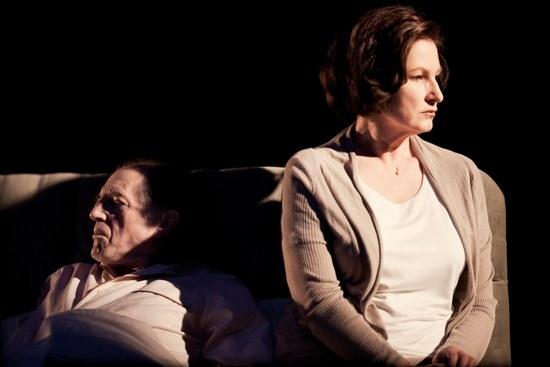One wants to be antagonised by Harold Pinter. In his substantial early dramas (The Homecoming, The Caretaker, The Birthday Party), aggression and menace coil through the texts like rattlesnakes. He was, then, revolutionary. Maybe it's glib - critical shorthand - to suggest that there were, thereafter, two to three decades of falling away; but some of us might feel that much of his later work either became hijacked by his belligerent, unnuanced politics or, simply and contrastingly, softened.
The latter charge cannot be laid against astonishing plays like No Man's Land (1975) and Betrayal (1978). But such linguistically and morally unsettling work in Pinter's prime was increasingly rare. Moonlight, written by a 61-year-old playwright, loudly praised and welcomed on its first Almeida Theatre performance in 1993, seems to me a somewhat muddled and unfocused affair, even if Bijan Sheibani's new Donmar staging has style and class written all over it.
 The best thing in the play, its lodestar, is the character of Andy, played by David Bradley, a bed-ridden, railing nihilist facing death, conducting a one-sided exchange with his wife Bel (Deborah Findlay) about his past. Pinter's rubric tells us that Andy is "in his fifties"; Bradley, delivering the part with aplomb and brisk articulacy, is about to turn 70 (and looks it) (pictured right). That's a problem. A younger man collapsed into premature mortality is shocking, dramatically compelling; an older one being, often, quite boring about his expected demise is not. (I didn't see the 1993 première with Ian Holm: but he was then 62.)
The best thing in the play, its lodestar, is the character of Andy, played by David Bradley, a bed-ridden, railing nihilist facing death, conducting a one-sided exchange with his wife Bel (Deborah Findlay) about his past. Pinter's rubric tells us that Andy is "in his fifties"; Bradley, delivering the part with aplomb and brisk articulacy, is about to turn 70 (and looks it) (pictured right). That's a problem. A younger man collapsed into premature mortality is shocking, dramatically compelling; an older one being, often, quite boring about his expected demise is not. (I didn't see the 1993 première with Ian Holm: but he was then 62.)
Peter Zadek, the German-born (naturalised British) director who staged Moonlight at the Berliner Ensemble in 1995, said the play was "like a mixture of Beckett and Agatha Christie". The Beckett is obvious: Malone (from the novel Malone Dies) and Krapp (in Krapp's Last Tape, which Pinter himself performed in 2006) both show up in Andy. Beckett was a capacious source for Pinter. But was he unaware of his borrowings? Belcher, for instance, is just one of a barrage of names Andy's disowning, dysfunctional sons Jake and Fred (Daniel Mays and Liam Garrigan, pictured below) throw around - and Belcher is of course famously at the heart of Lucky's mad soliloquy in Godot. I remain mildly concerned about where Pinter drew the line between tribute to his master and straight pilfering.
The Agatha Christie must, meanwhile, refer to the Englishness of the piece, the unashamedly drawing-room, middle-class banter of it, the endless, deliberately clunky clichés. But there's no crime or mystery here; just complaining, disconnection - two sons don't want to know their father is dying; a young woman, Bridget (Lisa Diveney), returns as a ghost - desolation and some tremendously overwrought verbiage. Example (says son Jake): "...sheer undaunted farsightedness, unflincing moral resolve, stern intellectual vision, classic philosophical detachment, passionate religious fervour, profound emotional intensity, bloodtingling spiritual ardour, spellbinding metaphysical chutzpah". Dah dah dah. One just wonders what it's all for. This is the first British revival of Moonlight since 1993 and it is, flaws notwithstanding, hugely watchable. Sheibani's designer Bunny Christie puts it into a kind of capsule, with Andy's bed stage left, Bel sitting on an old-fashioned chair with her embroidery, the brothers in what could be a student hovel to the right. The backdrop is a big dark rectangle brightly lit around each side. The lighting throughout is penumbral: lunar indeed.
This is the first British revival of Moonlight since 1993 and it is, flaws notwithstanding, hugely watchable. Sheibani's designer Bunny Christie puts it into a kind of capsule, with Andy's bed stage left, Bel sitting on an old-fashioned chair with her embroidery, the brothers in what could be a student hovel to the right. The backdrop is a big dark rectangle brightly lit around each side. The lighting throughout is penumbral: lunar indeed.
Findlay as the long-suffering but, when she needs to be, lippy widow-to-be is beguiling and poised, turning in, through these 80 minutes, the most attractive perfomance (her part is actually underwritten). The two young men are just as watchable, and Carole Royle as Maria and Paul Shelley as Ralph, a faintly sinister, interloping pair who seem to care more for Andy than the boys, open the play out - keep it real.
Yet plays must persuade, take you on a journey, weave a spell. According to a diary entry in his widow Antonia Fraser's account of their time together, Must You Go?, Pinter struggled to push this play to over an hour. Possibly this was because of its vanishing theme. The characters are quite thinly drawn and even Andy, with his rich expletives and verbal assaults on death, is more a voice than someone we get or want to know. Moonlight is fine poetry but frustrating drama.
- Moonlight at the Donmar Warehouse until 28 May
 Find Harold Pinter's plays on Amazon
Find Harold Pinter's plays on Amazon













Add comment